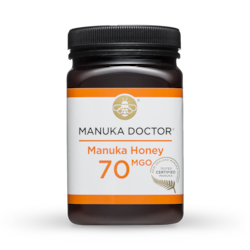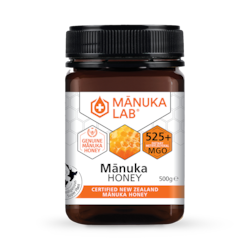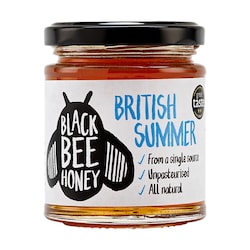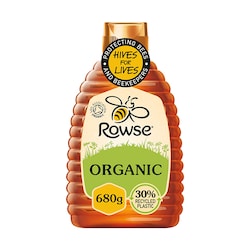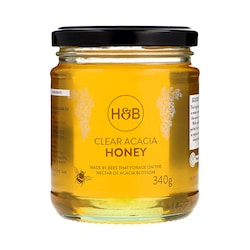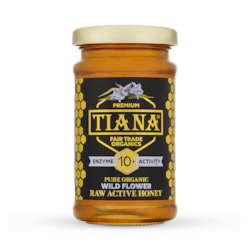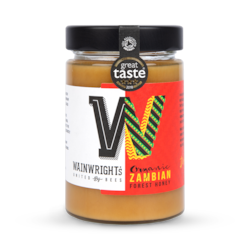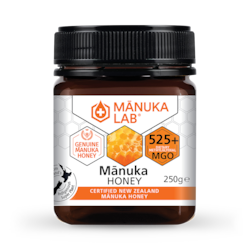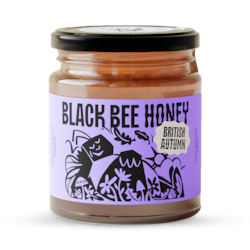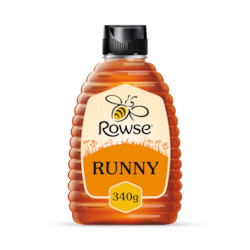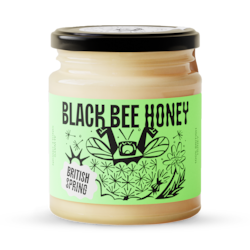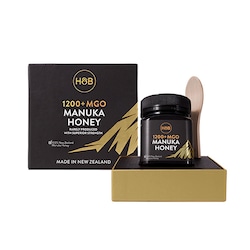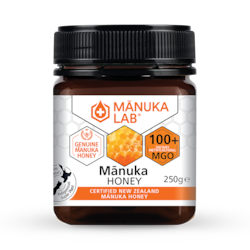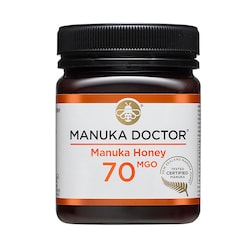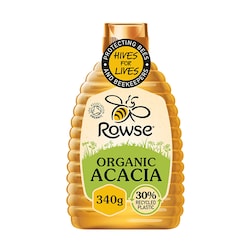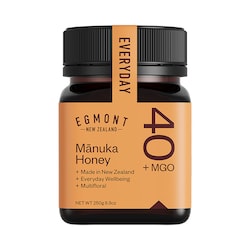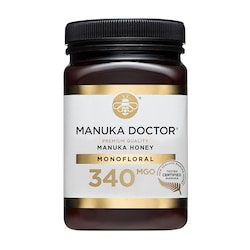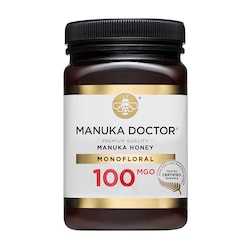15% off £30 OR 20% off £40
Manuka vs regular honey: The showdown
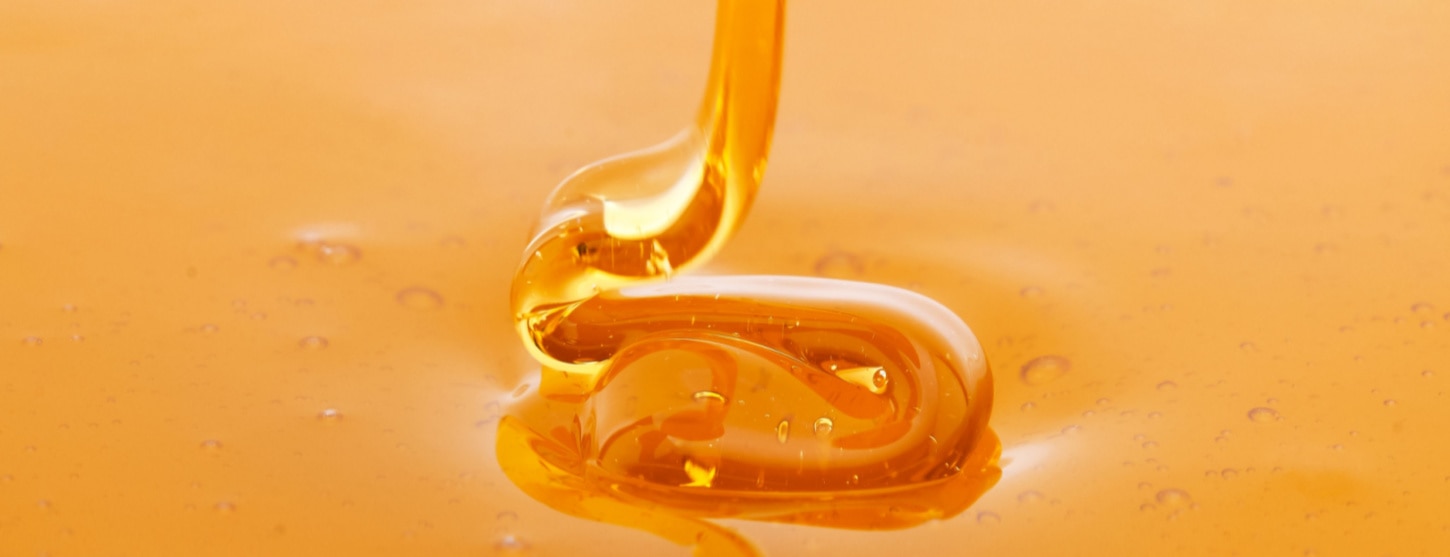
It’s true: manuka honey leaves your wallet a little lighter than your supermarket choice. It’s been dubbed a “wonder product” almost everywhere it goes, but you might still be wondering what exactly could make it worth it.
Time for the stats! We’ve put both to the test, and it turns out manuka has some specific benefits you won’t find in your “normal” (processed) honey.
Is it enough for you to make the swap…?
We’ll discuss…
- What is manuka honey?
- How can I spot real manuka honey?
And then it’s time for the ultimate test. We’ll compare:
- The sugar content of manuka vs regular honey
- The carb content of manuka vs regular honey
- The skin benefits of manuka vs regular honey
- The nutrition content of manuka vs regular honey
- The impact of manuka vs regular honey on gut health
- To summarise…
- What’s the verdict?
What is manuka honey?
You can find more about manuka honey in our comprehensive guide and video. But, in a nutshell: manuka honey is created from bees that feed off the Manuka tree.
This tree is only native to New Zealand and only blooms for 2 or 3 months per year.
If that’s not enough to put manuka honey in demand, the honey has potent antibacterial properties said to benefit your skin and help defend against certain health concerns.
That’s why there’s such a buzz (sorry) around it.
How can I spot real manuka honey?
Manuka honey is thicker and darker than regular processed honey; it’s more of a yellow-brown colour than the gold you might be used to.
Authentic manuka will have the official “Tested Certified Manuka” gold leaf symbol. You can find these on our manuka honey jars - we only sell manuka that’s 100% authentic.
You’ll also see the MGO or UMF rating:
- MGO signifies the amount of methylglyoxal which gives manuka its antibacterial properties. The higher the MGO, the more powerful its antibacterial activity. MGO tends to range from about 5 to 20.
- UMF describes the “Unique Manuka Factor” of the honey. This considers the MGO and two other substances called Leptosperin and DHA. Together, the UMF dictates how pure and potent the manuka honey is. Our honeys range from UMF 40 to an incredible 1000.
So how does manuka honey compare to regular honey…?
Read on to find out how manuka honey compares to regular!
-
It’s got less than half the sugar…
We’ll let you in on a secret: sweet tooth isn’t a dirty word.
Some sugar is necessary for our bodies: it provides energy to our muscles and brain and helps the body to metabolise fats.
Manuka honey is the perfect source of energy in your cooking, or consumed right off the spoon as part of a healthy, balanced diet.
The NHS recommends adults should have no more than 30g of free sugars per day - but a tablespoon of regular processed honey stacks in at 57% of your daily recommendation.1
Any kind of honey is preferable to refined sugar, as its fructose content makes it naturally sweeter and means it’ll take less to satisfy your cravings.
But when you’re spreading it on toast or blitzing it into a smoothie, it’s easy not to notice your sugar intake building up.
Manuka honey has under half the sugar of processed honey, at 7.81g per tbsp (to regular honey’s 17.2g).
It has a deeper taste than the honey you might be familiar with and makes a beautifully earthy substitute.
Manuka honey is worth considering if you’re lowering your sugar intake, which might be a focus if you’re trying to lose weight. Or maybe you just want to save your sugar allowance for something else!
So - while it still may not be advisable to drink it Pooh-Bear-style from the pot - opting for a lower-sugar honey like manuka is the next best option.
- Manuka honey: Has less than half the sugar of regular honey
- Regular honey: One serving could be 57% of your recommended daily sugar intake
-
…and the carbs
Did you know that almost all the sugars in honey come from carbohydrates? That means manuka honey also has less than half the carb content of regular honey.
A tablespoon of your usual honey comes in at about the same carbohydrate level as a serving of plain spaghetti.
Choosing manuka honey might help you avoid the “carb crash” and keep your energy levels more stable throughout the day.
Because of its higher sugar and carbohydrate content, regular honey is more likely to give you an intense “spike” of energy, followed by tiredness as your blood sugars dip to compensate.
So if you’re frequently fighting sleep at your desk, manuka honey could be worth a try. Drizzle some over your porridge, flour-free pancakes, or into natural yoghurt for a sweet breakfast that’s more conscious of carbs.
- Manuka honey: Has under half the carbohydrates of regular honey
- Regular honey: More likely to trigger energy spikes and “carb crashes”
-
It can help promote clearer skin
Honey is full of the antioxidants we search for in our skin creams. Applying it to your face could help healthy ageing and give you a natural glow.
But your regular, supermarket processed honey? Listen closely and you might hear the sound of your pores crying.
Thanks to its heating and filtering process (which destroys the antibacterial properties and helpful enzyme activity), “regular” honey is unlikely to reduce blemishes.
On the other hand, manuka honey retains its goodness! Its cleansing properties can help defend against the oil and dirt that can cause breakouts. Its darker colour is a sign of more antioxidants, which help stabilise harmful free radicals and support healthy ageing.
Manuka honey may decrease the redness and swelling that those with breakouts know all too well. It also contributes to a faster skin cell turnover, gently encouraging stubborn spot scars and active blemishes to improve.2
- Manuka honey: Rich in skin-friendly antioxidants. Retains the cleansing properties and helpful enzymes that could help soothe blemishes
- Regular honey: These benefits are destroyed during processing
-
It’s more nutritionally dense
We already know that manuka honey is lower in sugar and carbs than regular honey. So you might be surprised to hear it’s got slightly more calories.
But remember, more isn’t always worse! Calories are a unit of energy - and we should consider the nutritional density of the food we eat, too.
One tablespoon of manuka honey has 70 calories, while “regular” honey has 64. To clarify, that’s a 0.3% difference in your daily calorie recommendation. So why not choose all the benefits?
Manuka honey contains about 4 times the conductivity (mineral content) of normal honey.4 It’s full of trace elements like magnesium and vitamin A - and don’t forget its rich antioxidant content.
Manuka honey is also marginally higher in protein. It has 2g per tablespoon while regular honey has only 0.06g (small enough for food companies to legally register as 0).3
Protein contributes to muscle renewal and is responsible for the long-lasting satisfaction that keeps you going until your next meal.
It’s true: you likely can’t bulk up on manuka honey alone. But, if you struggle to meet your protein intake, every little helps!
- Manuka honey: Is slightly higher in protein and far more nutritionally dense
- Regular honey: Is marginally lower in calories but has fewer nutritional benefits
-
Manuka promotes healthy gut bacteria
Whether it’s a one-off gripe or part of a larger concern, an upset stomach can ruin your day.
Inside your digestive system is the microbiome, the term for the “good bugs” in your digestive system. A diverse, thriving microbiome is important in keeping the immune system strong and fighting off funky bacteria in the gut.
Manuka honey is an effective prebiotic - a food that helps healthy gut bacteria perform their best.
It contains fructo-oligosaccharides (FOS), which stimulate the growth of probiotic microbes lactobacillus and bifidobacterium.5
Research from the University of Auckland has also found that it can also inhibit the growth of a bacteria called H. pylori.6 This lives in about 40% of us and is usually harmless, but those less lucky can experience ongoing indigestion or even stomach ulcers.7
H. pylori infection is the second most common risk factor for gastric cancer, so it’s a great idea to try and keep your gut health in check even if you’re not currently experiencing any concerns.
Swapping your regular honey for manuka is one of the easiest ways to boost the healthy gut bacteria that fight off disease.
- Manuka honey: Helps to kill off harmful gut bacteria and maintain a thriving microbiome
- Regular honey: Has little to no effects on your overall gut health
To summarise…
- Manuka honey has under half the sugar and carbohydrate content of regular honey
- Manuka honey can have beneficial cleansing effects on the skin
- Manuka honey may help defend against harmful gut bacteria
- Manuka honey may provide a more stable, sustained source of energy
What’s the verdict?
Well, that’s up to you. There’s no shame in sticking to what you know and love - but maybe some of the benefits of manuka have caught your eye.
Plus, our extensive range of manuka honey means there’s one that might fit your budget.
Last updated: 13 July 2022
The advice in this article is for information only and should not replace medical care. Please check with your GP or healthcare professional before trying any supplements, treatments or remedies. Food supplements must not be used as a substitute for a varied and balanced diet and a healthy lifestyle.



